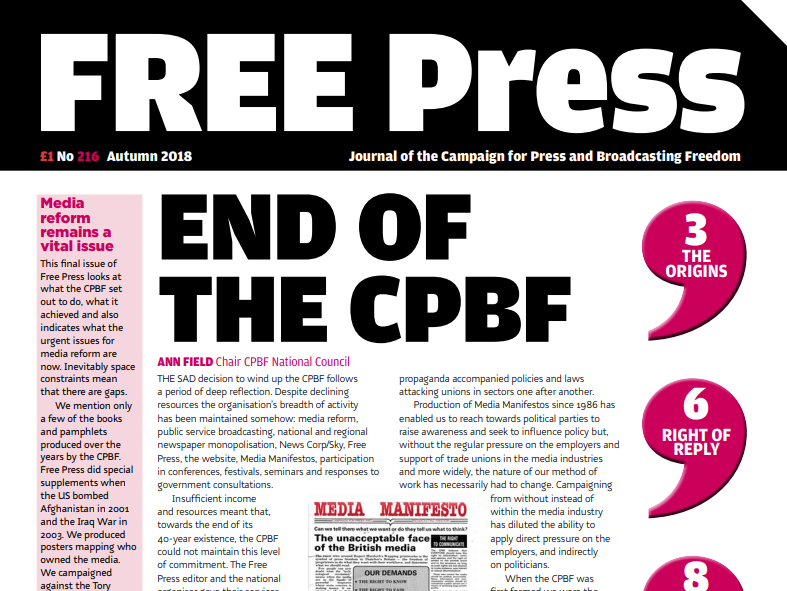
The Free Press, journal of the Campaign for Press and Broadcasting Freedom, has published its final edition.
The CPBF itself is set to close this month due to struggling finances, after almost 40 years of fighting for a “more diverse, democratic and accountable media”.
The reform group was founded in 1979 following the “winter of discontent”, to work with union workers who were unhappy about bias against them in the media, and it was affiliated with many of the biggest trade unions including the National Union of Journalists.
The CPBF’s campaigns included establishing a statutory right of reply, a strengthened Freedom of Information Act, protecting public service broadcasting, promoting diverse media ownership, and fighting against the broadcasting ban on Sinn Fein in the 1980s.
Since February 1980, Free Press has been mostly published six times a year, although it was reduced to four editions in recent years. Its editor had also begun working unpaid to cut costs.
Granville Williams, who edited the journal between 1992 and 2004 and returned to oversee the final edition out this week, told Press Gazette: “It was a unique organisation in the sense that the media unions, people who worked in the media, as well as people who read and criticised the media, were all members of the same organisation.
“So it represented trade unionists, people in academic life, and individuals, all of whom had a central interest which was they cared about the media, the importance of a diverse media, and a media which informed people accurately about the world in which we live. That’s what I’m sad that we’re losing.”
When the Government tried to ban Spycatcher, a book written by former MI5 agent Peter Wright in 1987, the CPBF produced a record The Ballad of a Spycatcher by singer Leon Rosselson and held public readings of the book in London.
The group also screened banned BBC documentaries Real Lives: At the Edge of the Union and Secret Society: Zircon in the mid 1980s.
Williams said: “The CPBF had had close connections with the Labour party but once Tony Blair took over he built a close link with Rupert Murdoch and I think we were frozen out during all of the New Labour years, and I think our effectiveness was limited, but we’ve kept going.
“I think that’s the achievement of the campaign – that when we were set up in 1979 I think very few people would have predicted that we would have gone on for 40 years so it’s been an achievement for the organisation to maintain its activity.”
The CPBF is closing after a fall in members and union affiliates which meant, despite a bequest of around £30,000 from a former member last year, it was unable to sustain its full activities.
CPBF national council chair Ann Field wrote in the final edition of the Free Press: “Production of media manifestos since 1986 has enabled us to reach towards political parties to raise awareness and seek to influence policy but, without the regular pressure on the employers and support of trade unions in the media industries and more widely, the nature of our method of work has necessarily had to change.
“Campaigning from without instead of within the media industry has diluted the ability to apply direct pressure on the employers, and indirectly on politicians.
“When the CPBF was first formed we were the only media reform organisation. Now there are scores of groups large and small mobilising on every aspect of press content, ownership and freedom – print and online.”
The CPBF is encouraging people to support the Media Reform Coalition, which was set up in 2011 to support media pluralism, defend ethical journalism, and protect investigative and local journalism by coordinating civil society groups, academics and media campaigners.
CPBF national organiser Josef Davies-Coates is also setting up a new group called Better Media with a co-operative funding model so all contributors can take part in its organising and decision making online.
It will begin by “rallying around” the proposals in the MRC and CPBF’s manifesto for media reform, including controls on media ownership, an independent, trusted and effective regulation of the press, and a well-funded independent public service media.
Email pged@pressgazette.co.uk to point out mistakes, provide story tips or send in a letter for publication on our "Letters Page" blog
